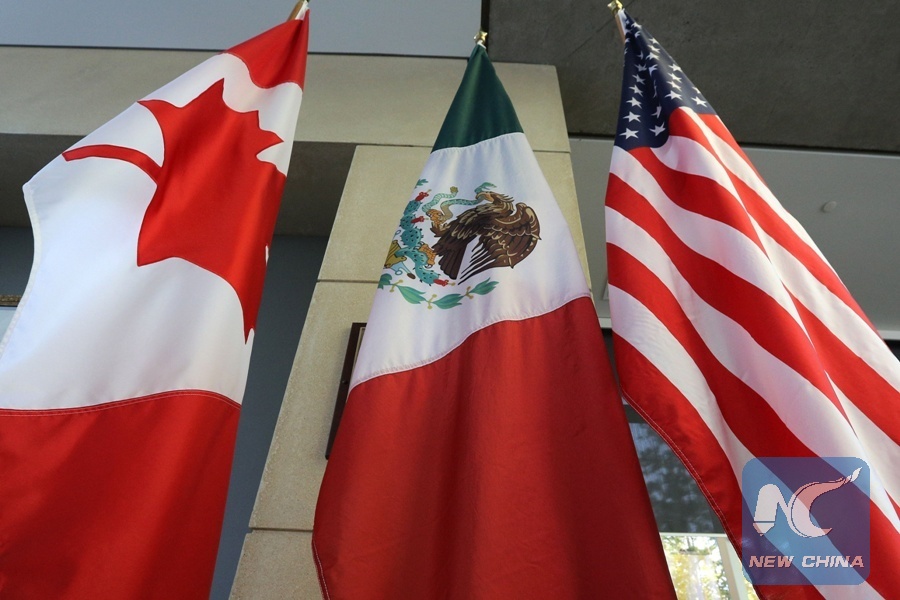
The file photo taken on Sept. 24, 2017 shows the Mexican, U.S. and Canadian flags in the lobby where the third round of the NAFTA renegotiations took place in Ottawa, Canada. (AFP Photo)
by Xinhua writer Gao Pan
WASHINGTON, May 31 (Xinhua) -- The U.S. tariffs on steel and aluminum imports from the European Union (EU), Canada and Mexico will complicate the ongoing talks to renegotiate the North American Free Trade Agreement (NAFTA) and raise the risk of a tit-for-tat trade war between the U.S. and its major trading partners, trade experts said.
U.S. President Donald Trump has decided not to extend the temporary steel and aluminum tariff exemptions for the three key trading partners as negotiations over the past two months have failed to result in a deal, Commerce Secretary Wilbur Ross said on Thursday.
A 25 percent tariff on steel imports and 10 percent tariff on aluminum imports will be imposed on the EU, Canada and Mexico starting from Friday, Ross told reporters at a conference call.
"We look forward to continued negotiations with Canada and Mexico on one hand and with the European Commission on the other hand as there are other issues we need to get resolved," he said.
The Trump administration is using the so-called Section 232 of the Trade Expansion Act from 1962 to unilaterally slap tariffs on imported steel and aluminum products on the ground of national security, which has drawn strong opposition from the domestic business community and U.S. trading partners.
"The EU believes these unilateral U.S. tariffs are unjustified and at odds with WTO (World Trade Organization) rules. This is protectionism, pure and simple," Jean-Claude Juncker, president of the European Commission, said Thursday in a statement.
EU Trade Commissioner Cecilia Malmstrom added that the EU will now trigger a dispute settlement case at the WTO, since these U.S. measures "clearly go against" agreed international rules.
"The tariff actions will do great harm to trade cooperation between the U.S. and its allies," Edward Alden, a senior fellow at the Council on Foreign Relations, told Xinhua.
"The EU will retaliate, and I believe will refuse to negotiate unless the U.S. lifts the tariffs. Mexico will also retaliate, and Canada is likely to do so as well," he said.
Alden believed the NAFTA negotiations will likely continue, but U.S. steel and aluminum tariffs "will hurt prospects for a deal" .
Talks on renegotiating the NAFTA began in August 2017 as Trump threatened to withdraw from the 23-year-old trade deal. The three countries remain divided over the rules of origin for autos and other issues after months-long negotiations.
Simon Lester, a trade policy analyst at the Cato Institute, also agreed that the steel and aluminum tariffs will make the NAFTA talks "more difficult" and undermine EU-U.S. trade relations.
As it takes too long for the WTO process to resolve trade disputes, Lester believed these trading partners will retaliate against U.S. exports "right away" .
Canada will impose retaliatory tariffs on up to 16.6 billion Canadian dollars (12.8 billion U.S. dollars) worth of U.S. products in response to the U.S. tariffs on steel and aluminum, Canadian Foreign Minister Chrystia Freeland announced on Thursday.
Canada's dollar-for-dollar tariff "countermeasures", which target everything from steel products to maple syrup and beer kegs, will take effect on July 1, and stay in place until the United States backs down, she said.
The EU also said it will retaliate with its own measures, and is considering the scale and extent of its response. It is widely reported that the EU would impose its own duties on U.S. products such as whisky, motorbikes, peanut butter and jeans.
"I think we are now in a trade war, which I define as an escalating conflict outside the rules of the WTO or other trade agreements," said Alden, warning that potential U.S. tariffs on imported autos would obviously be "a huge and damaging escalation."
The Trump administration last week initiated a national security investigation into automobile imports, which could lead to as much as 25 percent of tariffs on imported cars and disrupting global supply chains.
U.S. Republican lawmakers on Thursday also slammed the administration's decision to impose tariffs on steel and aluminum imports from the EU, Canada and Mexico.
"This action puts American workers and families at risk, whose jobs depend on fairly traded products from these important trading partners," House Ways and Means Committee Chairman Kevin Brady said in a statement, adding the administration must explain its rationale to Congress.
Republican Senator Ben Sasse from the state of Nebraska called the tariffs "dumb" and warned that tariffs in the 1920s led to the Great Depression.
"Blanket protectionism is a big part of why America had a Great Depression. 'Make America Great Again' shouldn't mean 'Make America 1929 Again,'" he said in a statement.
In response to the U.S. decision to impose metal tariffs, the International Monetary Fund (IMF) urged countries to "work constructively" to resolve trade disagreements.
"It is unfortunate that trade tensions are rising at a moment where the global recovery is being supported by trade," IMF Spokesman Gerry Rice said Thursday in a statement.
"Everybody loses in a protracted trade war, we encourage countries to work constructively together to reduce trade barriers and to resolve trade disagreements without resort to exceptional measures," he said.

